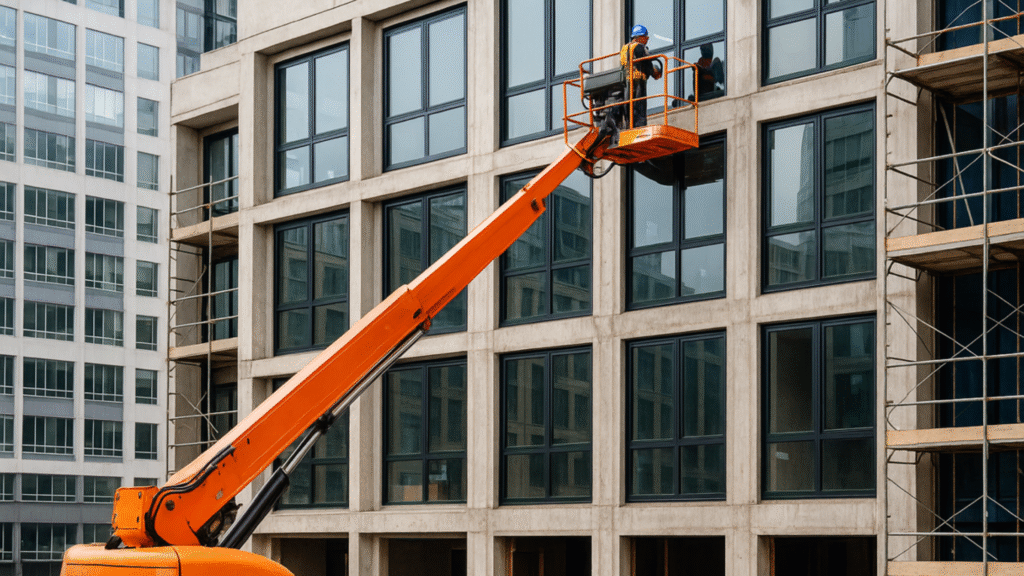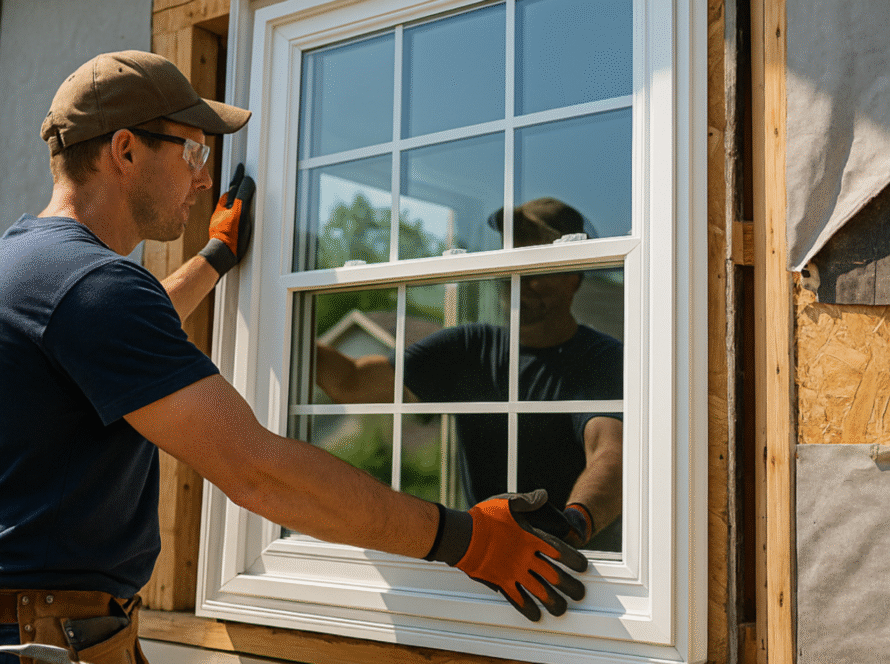
Commercial window replacement cost varies based on project scope, materials, and installation complexity. Bay Area builders and contractors working in Oakland, San Jose, Berkeley, and surrounding cities require reliable partners who understand bulk ordering, code compliance, and the demands of tight construction schedules.
Breaking Down Project Costs and Budget Planning
Understanding commercial window replacement cost helps builders and property managers create accurate project budgets and client proposals. Unlike residential work, commercial projects involve factors influencing the final price beyond simple square footage calculations. Bay Area construction presents additional considerations, including strict energy codes, seismic requirements, and urban logistics that impact both material selection and labor costs.
The initial cost for commercial window projects typically ranges from $400 to $1,200 per window opening, depending on the size, type of glass, and installation complexity. High-rise buildings in downtown Oakland or San Jose require specialized equipment and safety measures that increase expenses. Ground-level storefronts in Berkeley or Walnut Creek offer more straightforward access, but they may require compliance with historical district regulations. Competent contractors account for these variables during the bidding phase to avoid budget surprises during the project.
Key Factors Affecting Commercial Window Pricing
Material Selection and Performance Requirements
The type of window you specify has a significant impact on project costs. Standard aluminum frames with single-pane glass represent the lowest price point but rarely meet current California energy codes. Modern commercial window installations demand improved performance—double or triple glazing, low-E coatings, and thermal breaks that enhance energy efficiency while reducing heating and cooling costs for building occupants.
High-quality windows designed for commercial applications may cost more upfront, but they deliver long-term value through energy savings and reduced maintenance. Building owners in Fremont, Hayward, or Mountain View are increasingly requesting windows that provide better insulation, recognizing that premium products reduce operating expenses over a 20-30 year lifespan. As a contractor, presenting lifecycle cost analysis alongside initial cost figures helps clients make informed decisions.
Glass Specifications and Specialty Products
The type of glass selected has a significant impact on the cost of window replacement. Standard clear glass costs less than tinted, reflective, or low-E glass. Projects requiring fire-rated windows for code compliance often face higher material costs due to the specialized manufacturing process required for these windows. Soundproof windows with laminated glass layers command premium pricing but effectively address critical noise issues for buildings located near highways, airports, or entertainment districts throughout the Bay Area.
Security considerations add another cost layer. Ground-floor retail spaces in San Leandro or Union City may need impact-resistant glass. Buildings housing sensitive operations might require ballistic-rated products. Factor these specifications early in project planning to avoid budget adjustments that delay construction timelines.
Installation Complexity and Site Conditions
Labor costs vary substantially depending on the project’s accessibility and complexity. Second-story installations require different equipment than those at ground level. High-rises need crane rentals, street closures, and specialized window installers certified for high-altitude work. Buildings in dense urban areas, such as downtown San Jose or Oakland’s business district, face restricted access, limited staging areas, and strict working hours that impact productivity and total labor costs.
Existing window conditions also affect the complexity of replacement. Some commercial window frames can be retrofitted by reusing existing frames, thereby reducing costs and installation time. Other situations—particularly in older buildings throughout Alameda, Concord, or Pittsburg—require the complete removal of the frame and structural modifications. Thorough site assessments before bidding prevent unexpected expenses and project delays.
Managing Bulk Orders and Volume Pricing
Benefits of Consolidated Ordering
Commercial projects typically involve multiple window units, creating opportunities for volume discounts. Ordering 20-50+ windows simultaneously reduces per-unit costs through manufacturing efficiencies and consolidated shipping. Bay Area contractors working on multi-building developments in Livermore, San Ramon, or Antioch benefit from even deeper discounts when standardizing products across projects.
Establish relationships with suppliers who understand commercial construction timelines. Unlike residential window replacement, where homeowners often tolerate some scheduling flexibility, commercial projects are typically run on strict deadlines tied to lease agreements, tenant improvements, or seasonal business cycles. Reliable suppliers who maintain inventory and meet delivery commitments prevent costly construction delays.
Strategic Material Sourcing
Commercial window suppliers offer different service levels. Some provide products only, requiring contractors to arrange delivery and handle logistics. Others offer comprehensive support, including job site delivery, material staging, and installation assistance for complex projects. Evaluate suppliers based on total project costs, not just unit pricing. A slightly higher window price may prove cost-effective when supplier services reduce your labor costs and project duration.
For large projects, consider vendor partnerships that provide dedicated account management, priority manufacturing, and guaranteed pricing windows. Bay Area construction costs fluctuate in response to material availability and demand cycles. Locking prices early protects profit margins on projects with long development timelines.
Navigating Bay Area Code Compliance
California Energy Standards
Title 24 energy requirements significantly impact commercial window specifications throughout California. Bay Area projects must meet or exceed these standards, which dictate U-factors, Solar Heat Gain Coefficients, and visible light transmission ratios. Windows require specific performance characteristics based on climate zone—different requirements apply for foggy Berkeley versus sunny San Jose.
Work with suppliers who provide products certified for California compliance and are familiar with local jurisdiction requirements. Some Bay Area cities impose standards that exceed the state minimums. Building departments in San Francisco, Oakland, and other municipalities carefully review window specifications during plan checks. Specifying compliant products from the start avoids expensive change orders and permitting delays.
Seismic and Safety Requirements
Bay Area seismic codes affect window frame attachment methods and glass selection. Buildings in high seismic zones need frames that accommodate structural movement without compromising weather seals or glass integrity. Historic buildings require additional considerations—maintaining architectural character while meeting modern safety standards challenge contractors working throughout Berkeley’s preservation districts or Oakland’s downtown historic core.
Storefront windows in commercial buildings must meet specific safety glazing requirements. Ground-floor installations require tempered or laminated glass that prevents dangerous shards in the event of breakage. Upper-floor windows in certain applications require fall protection barriers or specific glazing that won’t create significant, dangerous pieces if shattered.
Optimizing Installation Scheduling
Coordination with Construction Timelines
Commercial projects involve multiple trades working simultaneously. Window installation timing affects numerous other contractors—interior finishers can’t complete their work until weather protection is established. However, installing windows too early risks damage from different trades. Experienced contractors develop detailed schedules that sequence work efficiently while ensuring the safety of completed installations.
Fall presents optimal conditions for commercial window projects throughout the Bay Area. Mild September and October weather facilitates efficient installations without weather delays common during winter storms. Completing window work before year-end also allows building owners to capture energy efficiency tax incentives for the current tax year. Plan large projects now to capitalize on favorable conditions and take advantage of year-end financial considerations.
Minimizing Business Disruption
Occupied buildings require special installation approaches. Retail spaces in Sunnyvale, Mountain View, or Santa Clara can’t typically shut down for days while contractors replace storefront windows. Office buildings in San Ramon or Walnut Creek need schedules that minimize tenant disruption. Plan installations during off-hours, weekends, or in phases that minimize disruptions to business operations.
Clear communication with building management and tenants prevents conflicts. Provide detailed schedules showing when specific areas will be affected. For multi-tenant buildings, coordinate with property managers to notify occupants well in advance of scheduled maintenance—professional contractors who manage these relationships effectively often secure repeat business and referrals.
Warranty Support and Long-Term Value
Comprehensive Coverage Programs
Commercial window warranties typically cover materials for 10-20 years and workmanship for 1-5 years. Review warranty terms carefully—some manufacturers exclude certain failure modes or require specific maintenance schedules to be followed. Understanding coverage helps contractors set appropriate client expectations and avoid disputes over responsibility when issues arise.
Partner with window suppliers who support contractors after installation. Questions about product performance, replacement part availability, and warranty claim processes shouldn’t leave you searching for answers. Suppliers who invest in contractor success provide dedicated support, helping you maintain client relationships and project profitability.
Maintenance Planning and Client Education
High-quality windows require minimal maintenance but benefit from periodic inspections and basic care. Educate building owners or property managers about simple maintenance tasks, such as cleaning frames, lubricating hardware, and checking weatherstripping, that extend window life and maintain performance. This proactive approach prevents minor issues from escalating into expensive repairs, while demonstrating your commitment to long-term project success.
For property managers overseeing multiple buildings throughout the Bay Area, establishing maintenance service agreements that provide regular inspections and minor repairs is essential. These relationships create ongoing revenue streams while ensuring windows continue performing as designed years after installation.
Building Strategic Partnerships
Bay Area commercial construction demands reliable partners who understand the region’s unique requirements. From seismic codes to energy standards, from urban logistics to seasonal weather patterns, successful contractors work with suppliers and window installers who bring specialized knowledge and proven track records.
Commercial window replacement costs reflect numerous variables—material specifications, installation complexity, code compliance requirements, and project timing all influence final pricing. Competent contractors develop accurate estimates by accounting for these factors systematically while building relationships with suppliers who support their success.
As construction activity continues throughout Oakland, San Jose, Berkeley, and surrounding Bay Area cities, the demand for skilled contractors who deliver quality commercial window installations on schedule and within budget remains strong. Position your business as the reliable partner builders and property managers trust for their most important projects.
Ready to streamline your commercial window projects? Get contractor pricing and support for Bay Area commercial installations. Discover bulk ordering benefits, scheduling assistance, and the partnership advantages that help your business grow.
Since 1987, Insight Glass has provided top-quality windows & patio doors in the Bay Area.
Call 707-746-6571 for Expert Installation!
CONTACT US TO GET A FREE ESTIMATE!


